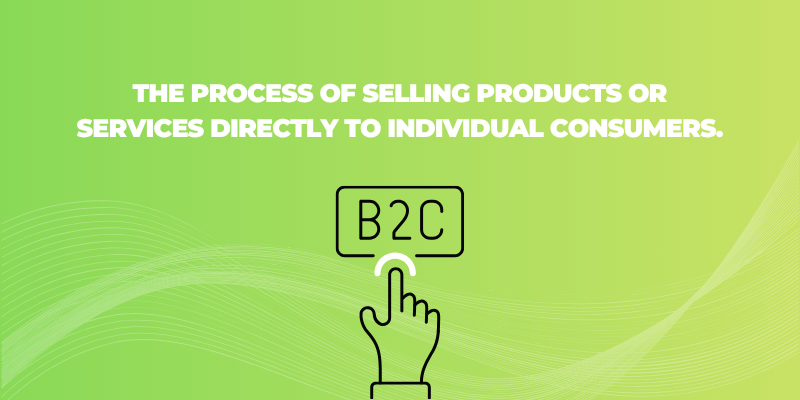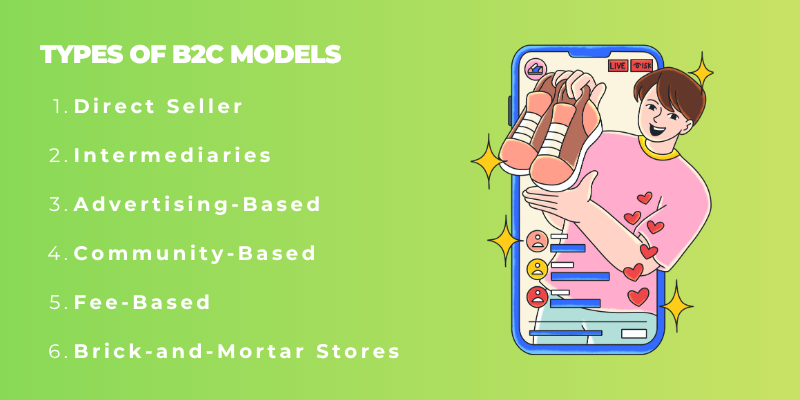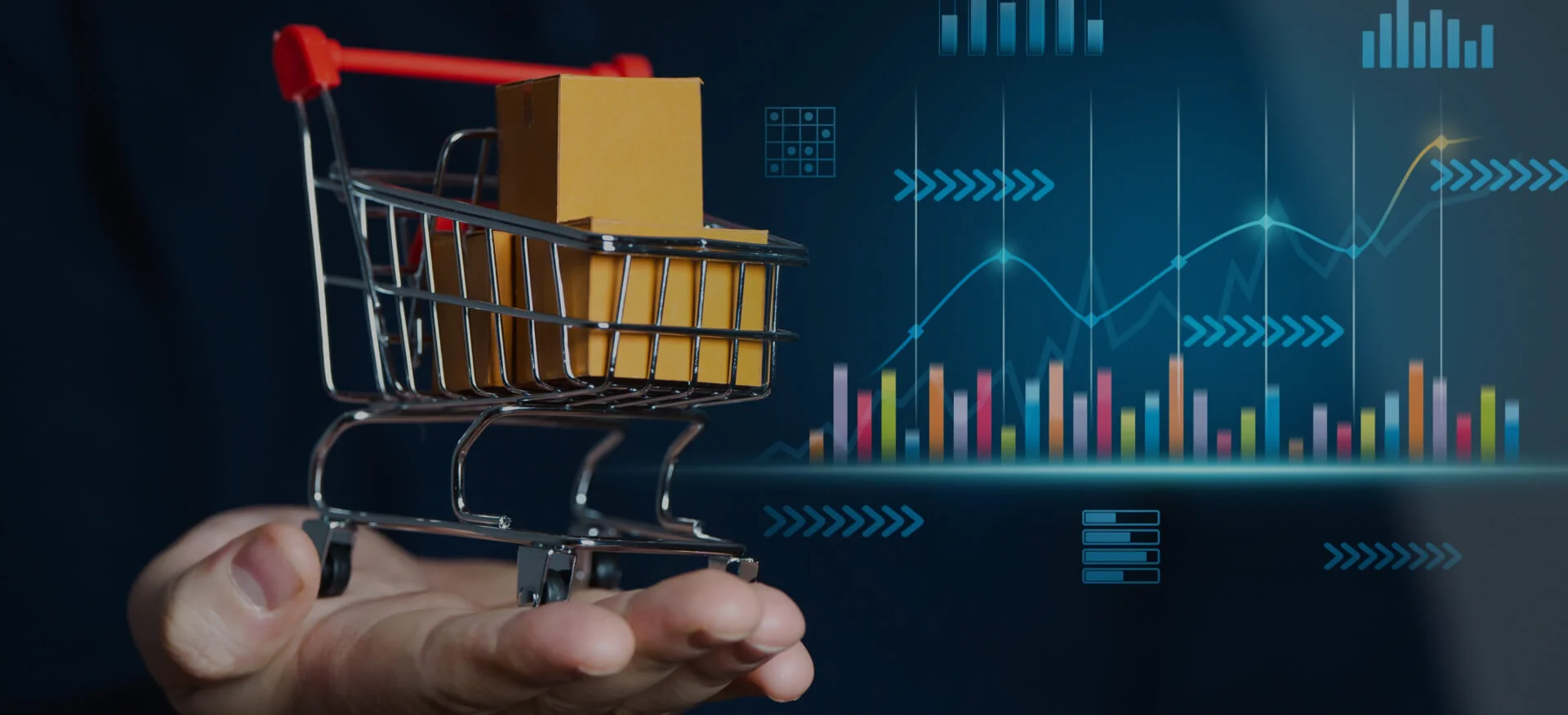Business-to-Consumer (B2C) sales refers to the direct transaction between a business and individual consumers.
In this model, businesses sell products or services directly to end-users for personal use.
This is in contrast to Business-to-Business (B2B) sales, where the focus is on selling to other companies or organizations rather than individuals.
B2C sales encompass a wide range of industries, from retail and e-commerce to entertainment and services, all aimed at fulfilling consumer needs and preferences.
Also, the rise of online shopping, mobile apps, and social media marketing has made B2C transactions more accessible and efficient than ever before.
Given this, it is expected that the global B2C e-commerce market size will reach around USD 16.83 trillion by 2030.
Technology and digital marketing have enabled businesses to reach a global audience, build brand awareness, and personalize customer experiences at scale. Many businesses may seek B2C website designers to help create seamless online experiences that drive conversions.
This approach is similar to high ticket affiliate marketing, where affiliates earn substantial commissions by promoting expensive products or services, and the digital strategy often integrates these methods into its core.
This post aims to provide a detailed understanding of what is B2C sales are and their process, with key components, and strategies for businesses to succeed in the competitive landscape.
Understanding Business-to-Consumer (B2C)
Business-to-Consumer (B2C) is one of the most widely recognized and established sales models. The concept of B2C was first introduced by Michael Aldrich in 1979, who envisioned using television as a primary medium to connect businesses with consumers.
Historically, B2C referred to traditional methods like shopping in malls, dining out at restaurants, watching pay-per-view movies, or responding to infomercials.
However, the advent of the internet revolutionized this model, giving rise to e-commerce the buying and selling of goods and services online.
While many B2C companies were adversely affected by the dotcom crash, with investor interest waning and venture capital drying up, industry giants such as Amazon and Priceline managed to survive the downturn.
For example, certain industries, like an oil and gas marketing agency, have also adapted digital strategies to connect with consumers more effectively in today's market.
In a similar manner, what is network marketing? It is another business model where individuals promote products directly to consumers, often involving multi-level marketing strategies.
These companies have since flourished, becoming major players in the global market and reshaping the landscape of consumer business.
To stay competitive, many of these businesses rely on enterprise SEO services to improve their online visibility and customer reach.
Explore Our Digital Marketing Services!
What Is B2C Sales?
Business-to-Consumer (B2C) refers to companies that sell products or services directly to individual consumers.

This term is commonly used to describe various consumer market models, including:
- Manufacturers selling products through online platforms or physical stores
- Consumer service providers
While B2C can cover a wide range of industries, it is often used more specifically to refer to businesses that sell directly to consumers, without involving intermediaries or third-party retailers.
For example, in a B2C model, understanding what is illustration, such as in product packaging, can play an important role in creating visually appealing content that attracts customers.
How B2C Sales Marketing Works?
B2C marketing focuses on attracting individual consumers by highlighting the benefits of the product or service. It uses various channels like social media, email campaigns, and online advertisements to create a connection with the customer. By engaging customers in this way, businesses encourage brand loyalty and repeat purchases.
B2C sales strategies often involve personalized marketing efforts. For example, email marketing allows businesses to reach out directly to customers with promotions, recommendations, or updates tailored to their preferences. Similarly, social media platforms like Instagram, Facebook, and Twitter allow brands to engage with their audience more interactively.
6 Types of B2C Models
While the term "B2C" is often associated with retailers and online marketplaces, it also applies to content and service providers.

According to the Census Bureau, non-store businesses account for 72.4% of all B2C retail activity.
Most B2C business models fall into the following types:
1. Direct Seller
These are the most typical e-commerce businesses where customers purchase directly from online stores. These companies own and sell their own products through platforms like Zappos.com, Ikea.com, and Target.com.
2. Intermediaries
Unlike direct sellers, intermediaries don’t offer their own products. Instead, they provide a platform that connects buyers with independent sellers or resellers.
It's important to distinguish this from other models; for instance, online classified ads are an example of C2C e-commerce, where transactions occur between individual consumers rather than businesses selling to consumers.
3. Advertising-Based
These e-commerce companies use traffic-driving digital marketing strategies such as content marketing and social media outreach to connect consumers with relevant ads. They generate profit by selling advertising space on their websites or platforms. An example of this would be how Google Ads cost businesses to bid on keywords that help them reach the right audience, impacting their overall marketing budget.
Affiliate marketing is another common approach in which companies collaborate with content creators to promote their products through blogs or social media.
4. Community-Based
Similar to advertising-based models, community-based companies build online communities around specific interests or identities.
They gather user data (e.g., demographics and geographic location) to target these users with personalized ads. Examples include social media platforms like Facebook and online forums.
Additionally, companies seeking to enhance their digital presence may look into Progressive Web App services to offer seamless, app-like experiences across multiple devices.
However, businesses must ensure that any content they don't want to be indexed by search engines is properly labeled with a "noindex" tag to prevent unnecessary visibility.
5. Fee-Based
These businesses operate on a subscription model, where users pay for access to exclusive content or services. Well-known examples include subscription services like The Wall Street Journal, The New Yorker, and Netflix.
6. Brick-and-Mortar Stores
Traditional B2C businesses that operates physical locations where customers can directly interact with products or services. These businesses allow consumers to touch, feel, and purchase items in person.
5 Benefits of B2C Sales
B2C (Business-to-Consumer) sales offer several key benefits:
1. Large Customer Base
B2C businesses typically cater to a vast consumer market. With a large number of potential buyers, these businesses have the opportunity to sell high volumes of goods and services, which is key for growth and profitability.
2. Faster Sales Cycle
The B2C sales process tends to be quicker compared to B2B. Consumers often make buying decisions more rapidly, especially with the convenience of online shopping, allowing businesses to close sales faster.
For example, when evaluating the most effective strategies, retailers may wonder what are five marketing strategies that retailers spend half of their annual budget? on to ensure they reach the largest number of customers effectively.
3. Brand Loyalty and Repeat Purchases
Satisfied consumers are more likely to make repeat purchases, subscribe to services, or engage in loyalty programs. B2C businesses can build a loyal customer base, which can result in a more stable revenue stream.
For instance, when consumers revisit an online store, they may wonder how to search for words on a page to find specific products quickly, improving their shopping experience and satisfaction.
4. Marketing and Advertising Opportunities
B2C businesses can engage in diverse marketing strategies such as digital advertising, social media campaigns, email marketing, and influencer collaborations. This provides ample opportunities to reach customers and increase brand awareness. When thinking about advertisement examples, businesses often utilize Google Ads, banner ads, or even sponsored posts to engage potential buyers.
5. Scalability
B2C businesses often have more flexibility to scale quickly, especially in the digital space. With a robust online presence, businesses can easily expand their reach to national or international markets without the complexities of large-scale infrastructure.
Why B2C Sales Are Important for Your Business?
As the world shifts towards digital, B2C sales are essential for businesses looking to expand their reach. Not only do they provide companies with access to a larger pool of customers, but they also allow businesses to collect data on consumer behavior. This data is valuable for tailoring marketing campaigns, improving customer service, and enhancing the overall consumer experience.
For instance, B2C marketing strategies such as retargeting ads and personalized offers are powered by consumer data, ensuring businesses reach their audience with the right message at the right time.
The Role of Mobile in B2C Sales
Mobile devices play a major part in modern B2C sales, with companies creating apps to connect with users on the go. In 2025, mobile commerce accounts for 59% of total retail e-commerce sales globally, amounting to $4.01 trillion. This shift means businesses focus on mobile-friendly sites and apps to handle purchases directly from smartphones. For example, retailers like Amazon use mobile notifications and one-click buying to speed up transactions. Mobile traffic now makes up over 60% of all website visits, pushing companies to prioritize this channel for sales growth.
To show the projected growth of the global B2C e-commerce market, here is a table based on recent forecasts:
| Year | Market Size (Trillion USD) |
| 2025 | 7.69 |
| 2026 | 8.99 |
| 2027 | 10.52 |
| 2028 | 12.3 |
| 2029 | 14.38 |
| 2030 | 16.82 |
This table highlights the steady increase driven by factors like mobile adoption and wider internet access.
B2C vs. B2B: Key Differences
Many B2C businesses, especially those with large audiences, invest heavily in marketing.
Video ads and commercials are common components of B2C marketing strategies because they can reach a wide audience, evoke emotional responses, and enhance brand recognition.
In contrast, B2B businesses target specific clients, making broad advertising channels like print, TV, and social media less effective and more costly. The focus in B2B marketing is on reaching a select group of decision-makers, rather than the mass market. This is where the concept of B2B vs B2C comes into play each model focuses on different target groups with distinct marketing approaches.
Additionally, B2C marketing often targets individuals based on demographic characteristics. For B2C retailers, especially e-commerce businesses, cross-selling and up-selling can be crucial for boosting sales.
Unlike the B2C business model, pricing structures in B2B are generally more flexible. In B2C, consumers usually pay a fixed price for the same product.
However, in B2B, prices are often negotiable, with businesses discussing pricing and payment terms based on factors such as order volume, long-term contracts, or specific requirements.
The B2C Future of Business
Business-to-consumer models are at the forefront of innovation, reshaping the way consumers discover and purchase products.
With the rise of e-commerce, businesses can now access a global, round-the-clock audience without relying on intermediaries. Global B2C e-commerce sales are projected to hit $8 trillion by 2027.
Frequently Asked Questions
What does B2C mean in sales?
B2C stands for Business-to-Consumer, referring to businesses selling products or services directly to individual customers for personal use.
What is the difference between B2B and B2C sales process?
B2B (Business-to-Business) involves selling to other businesses with longer, relationship-driven processes, while B2C focuses on quick, emotional purchases by individual consumers.
Which is harder, B2B or B2C?
B2B is often harder due to longer sales cycles and multiple decision-makers, while B2C requires rapid engagement to capture consumer attention.
What are the disadvantages of B2C sales?
B2C sales face high competition, lower profit margins, and reliance on emotional marketing, making it challenging to retain customers.
Conclusion
In today's competitive marketplace, adopting a comprehensive B2C sales strategy is essential for sustained growth and customer loyalty. A holistic approach considers every touchpoint in the customer journey, from initial awareness to post-purchase support, ensuring a seamless and personalized experience. By integrating various marketing channels and aligning them with customer expectations, businesses can create consistent messaging that resonates with their target audience. This unified strategy not only enhances brand perception but also fosters trust and long-term relationships with consumers.
To optimize B2C sales, businesses must embrace continuous learning and technological innovation. Staying informed about emerging trends and consumer behaviors allows companies to adapt their strategies effectively. Leveraging advanced technologies, such as artificial intelligence and data analytics, can provide deeper insights into customer preferences, enabling more targeted and efficient marketing efforts.









